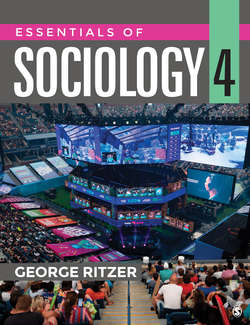Читать книгу Essentials of Sociology - George Ritzer - Страница 145
На сайте Литреса книга снята с продажи.
Family
ОглавлениеIn a process known as primary socialization, newborns, infants, and young children acquire language, identities, cultural routines, norms, and values as they interact with parents and other family members (Laible, Thompson, and Froimson 2015). This socialization lays the foundation for later personality development. Early socialization performs various functions for society, such as equipping the young to fit better into society and perpetuating the culture from one generation to the next.
In addition to a great deal of primary socialization, parents provide anticipatory socialization—that is, they teach children what will be expected of them in the future. Anticipatory socialization is how parents prepare children for the important developmental changes (puberty, for example) they will experience. Among the many other things that must be anticipated in family socialization are entrance into grade school, high school, college, the work world, and life as an independent adult. Anticipatory socialization is especially important in societies and in time periods undergoing a great deal of change. Children need to be prepared not only for changes within society but also for changes within the family and changes that will affect them more directly.
Many assumptions about primary and anticipatory socialization are changing dramatically as the nature of families and the way in which they are understood culturally undergo major transformations. The socialization process was thought to be rather straightforward when the ideal of the nuclear family, composed of a mother, a father, and two or more children all living in the same home, predominated, as it did throughout much of the twentieth century. The lesson children were required to learn, at least as far as the family was concerned, was that when they became adults, they would go on to reproduce the same kind of nuclear family as the one in which they grew up. However, assumptions about the goodness and inevitability of the nuclear family and the ease of the socialization process now seem impossible to accept (McLanahan 1999). This is the case because of increasing public awareness of the many problems associated with the nuclear family, such as divorce, abuse, and unhappiness (see Chapter 10).
Then there is the expansion of what were at one time called “alternative family forms” (e.g., single-parent households, grandparents as primary caregivers) and the increasing centrality of day care centers and their workers to the socialization process (Patterson, Farr, and Hastings 2015). The agencies doing the socializing today are much more complex and varied than they were in the era of the predominance of the nuclear family. As a result, socialization is not as straightforward as it once was thought to be. In addition, it is no longer possible to think of a seamless relationship between the agencies of socialization and the socialization process. For example, the family may be socializing its children in one way, but the day care center may be doing it very differently.
At one time socialization was seen as one-directional, for example, from parent to child. Current thinking sees such socialization among intimates as two-directional, even multidirectional, with parents socializing children and children socializing parents, other adults, and families (Gentina and Muratore 2012). Children tend to be far more familiar with the latest advances in digital technology than their elders are, and they teach their parents much about both the technology itself and the digital culture. Another example is found in the large number of immigrant families in the United States and elsewhere. Children in these families are more likely than their parents to learn the language and culture of their new country (often in school). As a result, they are frequently the ones to teach, or at least try to teach, that knowledge to their parents (Mather 2009). This is reverse socialization, in which those who are normally being socialized are instead doing the socializing.
Ask Yourself
Have you experienced any instances of reverse socialization? For instance, have you taught your parents how to use their smartphones or set up Facebook pages, or has a younger relative or friend introduced you to a new smartphone app? What was this experience like?
